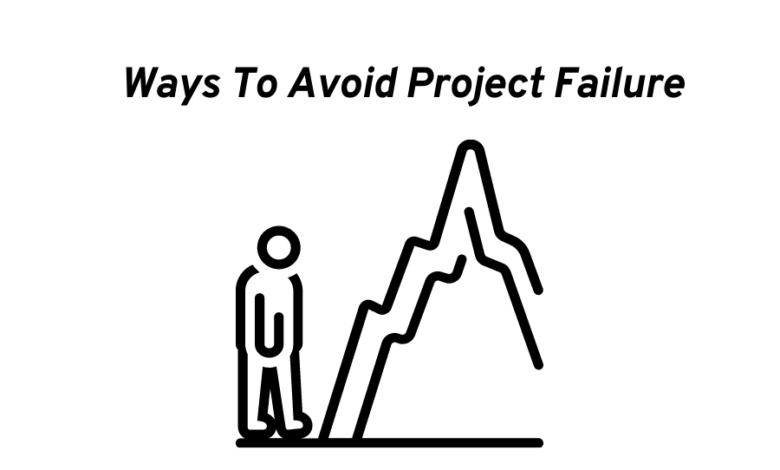Top 8 Ways To Avoid Project Failure

Even though a project’s success relies on the shoulders of the whole team, their efforts & a set of circumstances yet when a project fails, the project manager is called out & he’s considered responsible for the project failure. Well, that’s a bit unfair… isn’t it? Don’t worry, pal; no one is going to punish you or kick you out from the job. It will only tarnish your image as a project manager. Sounds bad?
In a real-life scenario, a project consists of hundreds of tasks that different team members carry out, but as a project manager, it is your responsibility to make sure everything is in the right place. To help you with that, we have listed down a few tips to ensure that your project runs smoothly without fail.
1) Adopt a proactive approach
If you want to complete your project successfully, you need to be proactive on each step, be it communication with team members & stakeholders, managing the risks, resource management & allocation, etc.
A project manager’s responsibility starts even before the beginning of the project. You have the responsibility of choosing a team, sources for resources, and what now! Only hire team members who are skilled and can be trusted. And before rushing to start the project, make sure everything is in the right place.
2) Plan, Plan & Plan!
Planning is undoubtedly the most important stage for any project. Most of the time, project managers and organizations don’t focus on planning and think that they will figure out things as they go. But believe me, this is a sure-shot way to increase the chances of project failure. Planning is something that decides the path and process that you are going to take to complete the project and make strategies on how you’ll handle various constraints and unforeseen problems. Take your time in the planning process & do the market research, analyze all the factors (political, environmental, social, technological, economic & legal), understand the potential risks & threats, then plan accordingly.
Once you have analyzed, planned & collected everything, then start executing the project. And even in the execution part, do follow the Project Management Life Cycle.
4) Manage & Avoid Scope Creep
While deciding the goals and deliverables of the project, make sure to keep everything as transparent as possible. Also, prepare a scope statement where the scope, objectives, deliverables, etc., is written clearly.
There are times when stakeholders first ask you for small changes, then some more changes, then a few more that too without any adjustments in budgets and deadlines. This seriously hampers the progress of a project.
These demands will only distract your team & affect the planned cost and the schedule.
The best way to avoid scope is to keep stakeholders involved during the planning & objective setting process. And preparing a scope statement to have everything in the written format.
5) Avoid Unrealistic Expectations
Setting realistic deadlines and expectations is crucial for any project. Never set unrealistic expectations and time frames when it is not ideally possible. Doing this will only create a problem for you, your team & also for your client. There have been numerous cases when teams have gone on strikes and have conflicted against project managers due to overwork.
Expectations must only be set after understanding the capabilities of the team. Instead of instigating fear, you should encourage your team to work with enthusiasm and positively push them to get beyond their comfort zone & timely reward them to keep their spirits up.
6) Track Project’s Progress
You should have proper tools and processes to track your project’s progress. Keep an eye on how everything is going. The easiest way to track your project’s progress is by considering where it should be and where it actually is. And that you bring in your control measures to identify how much of the work has been completed and how much is left.
To find all of these details accurately, you should consider these three factors-
- Schedule
- Scope
- Cost incurred
These are the three parameters that help measure and control any project at any given point in time.
7) Identify Risk Factors
Most of the risks in project management can be avoided, but some risks cannot be avoided and will certainly happen. So, the best possible thing you can do is identify, analyze and respond to the risk factors.
But that can only be beneficial at the starting stage of the project; once the project is partially completed, these unavoidable risks will definitely hamper your project. If you find out the potential risks and issues in the beginning, you can make a proper action plan to tackle and avoid these risks.
Some of the best ways to identify risks are Brainstorming, PESTEL Analysis, and Risk Assumption. Identifying risk factors will help the project manager to minimize the chances of failure.
8) Listen To Everybody
Being a project manager doesn’t mean you should be perfect and have all the skills and knowledge of the world. So, when a problem arises, you should take inputs from your team members, stakeholders, and other professionals around you.
Discuss the problems and their potential solutions to the team members. Not only will it help solve the problems faster, but it will also result in the personal growth of your team. Listen to everyone’s solutions and consider the suggestions they share with you. And finally, choose the best alternative after proper brainstorming.
Conclusion
These were some of the practical ways that can actually save your project from failure. Keeping all of these factors in mind will help you complete your project smoothly and complete it on time. Getting a PMP certification is also a great way to learn all of these in detail and enhance your skills. Jump here to know how to crack PMP Certification and upskill yourself to become a better project manager.
Author Bio
Senior Data Scientist and Alumnus of IIM- C (Indian Institute of Management – Kolkata) with over 25 years of professional experience Specialized in Data Science, Artificial Intelligence, and Machine Learning.
PMP Certified
ITIL Expert certified APMG, PEOPLECERT and EXIN Accredited Trainer for all modules of ITIL till Expert Trained over 3000+ professionals across the globe Currently authoring a book on ITIL “ITIL MADE EASY”.
Conducted myriad Project management and ITIL Process consulting engagements in various organizations. Performed maturity assessment, gap analysis and Project management process definition and end to end implementation of Project management best practices
Social Profile Links
- Twitter account URL- https://twitter.com/ramtavva?s=09
- Facebook Profile URL- https://www.facebook.com/ram.tavva
- Linked In Profile URL https://www.linkedin.com/in/ram-tavva/








hi,
thank you for sharing
But learning R is difficult than learning Pythons because R is not in English-like statements, so the aspirants need to know it more deeply to have a grip on the language.
HI I am very happy to here and read yours wonderful article. thanks for sharing this important informative article with us, I have learnt many points in this article. Hope to write many articles like this!